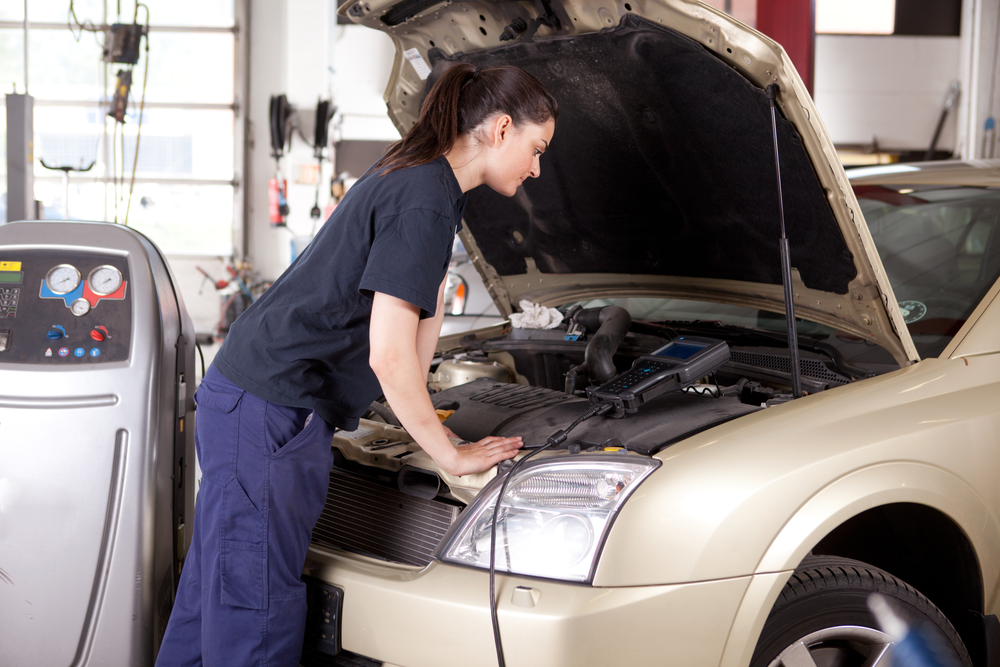Simply waiting for the check engine light to insistently flash on your dashboard isn’t enough these days to sidestep car troubles.
Slight vibrations in your steering wheel or brakes that grind and become less effective are surefire, though sometimes subtle, signs that you’re overdue for a tune up.
Always tell you mechanic about problems that you’re experiencing, such as poor fuel economy.
Poor Fuel Economy
Have you noticed that you’re paying much more at the pump every time that you fill up?
It could be that you need your spark plugs replaced. Spark plugs should be replaced around every 30,000 miles, but that’s only a ballpark estimate.
The truth is that only a mechanic can tell you when the base of your spark plug is more oily than it should be upon pulling it out of the engine or whether your copper spark plugs (copper is cheaper but wears more quickly than platinum spark plugs) should be replaced at your tune up.
Fuel injector problems, going too long without a proper tire rotation, and using inferior motor oil can worsen your fuel economy over time.
Not only that – these cut-rate motor oils can wear down your parts prematurely and require major vehicle maintenance later (e.g., an engine replacement). All Around Auto Repair doesn’t cut corners and only uses the most advanced synthetic blends.
Ignoring Vehicle Consumerables
Consumerables in your vehicle need to be checked and usually replaced at irregular intervals to account for your unique driving conditions.
Hoses and rubber gaskets can wear out when you least expect them and, honestly, would be know whether one needed to be replaced? You might notice other consumerables like your tires and wiper blades looking the worse for wear, though.
The way in which you drive your vehicle can also impact the wear-and-tear damage on your vehicle and how often you need to repair particular parts.
Light-footed drivers might find that their fuel filter or engine needs to be checked much more frequently than 30,000 miles or so.
At a tune up, you can get that all checked out while you enjoy coffee waiting. All Around Auto Repair does engine work, routine maintenance, brakes and everything in between.
Strange Sounds
Squeling from your brake pads, grinding from under the hood that might or might not be a transmission issue, or a clicking noise near your drive shafts could mean big trouble.
Clicking from under your car could mean that your CV (constant velocity) joints are worn-out and overdue for replacement. That’s something that can be quickly detected when you take your vehicle in for a tune up at All Around Auto Repair.
In fact, the mechanics at All Around Auto Repair can also help you diagnose other kinds of problems like hissing from under the hood or a metallic tapping noise. The hissing from the front of your vehicle could be leaking coolant – a serious issue – or an engine that’s overheating.
A metallic tapping or ticking noise, on the other hand, could mean that your vehicle is failing to maintain the right oil pressure. The mechanics at All Around Auto Repair will check for these strange noises and car problems at your next tune up.
Get Filters Changed
It’s amazing how many filters your vehicle needs to function optimally. Most vehicles have at least four main types of filters: the cabin filter, fuel filter, air filter, and oil filter.
An old air filter can tank your fuel economy and make you wish that you took your vehicle to All Around Auto Repair for a tune up much sooner. Schedule an appointment today here.
Frequently Asked Questions on Reasons to Tune Up your Vehicle
What are the signs that my vehicle needs a tune-up?
Signs include slight vibrations in your steering wheel or brakes that grind. These can indicate issues that need attention before they worsen.
How often should spark plugs be replaced?
Spark plugs typically need replacement every 30,000 miles. The type of spark plug (copper vs. platinum) and engine conditions can affect this interval.
What causes poor fuel economy in vehicles?
Poor fuel economy can stem from issues like dirty spark plugs, fuel injector problems, improper tire rotation, and the use of low-quality motor oils.
Why is it important to check vehicle consumables regularly?
Vehicle consumables like hoses, gaskets, tires, and wiper blades wear out over time and affect vehicle performance and safety.
What do strange sounds from my vehicle indicate?
Sounds like squealing brakes or clicking noises could signal issues with brake pads, CV joints, or engine components needing attention.
How often should vehicle filters be changed?
Filters such as the cabin filter, fuel filter, air filter, and oil filter should be regularly inspected and replaced to maintain vehicle performance.
What should I do if my vehicle overheats or leaks coolant?
Hissing sounds or coolant leaks could indicate overheating issues, which require immediate attention to prevent engine damage.
Can I diagnose vehicle problems myself?
While some issues like tire pressure or basic fluid checks can be done at home, complex problems require diagnosis by a qualified mechanic.
Why is regular maintenance important for vehicle longevity?
Regular maintenance prevents costly repairs by identifying and fixing small issues before they escalate into major problems.
How can I find a reliable auto repair shop for my vehicle?
Look for shops that are certified, have good reviews, and specialize in your vehicle’s make and model to ensure quality service.




